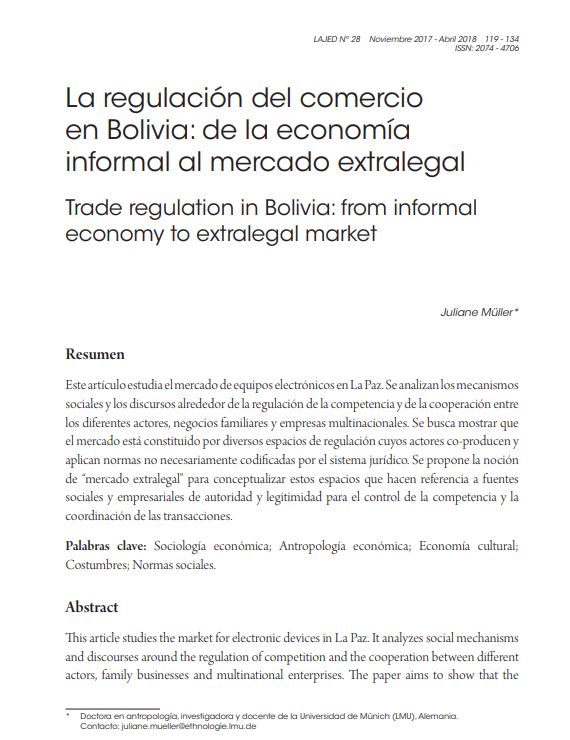Trade regulation in Bolivia: from informal economy to extralegal market
DOI:
https://doi.org/10.35319/lajed.20172841Keywords:
Economic Sociology, Economic Anthropology, Cultural Economics, Customs, Social NormsAbstract
This article studies the market for electronic devices in La Paz. It analyzes social mechanisms and discourses around the regulation of competition and the cooperation between different actors, family businesses and multinational enterprises. The paper aims to show that the market is constituted by diverse spaces of regulations and actors who co-produce and apply norms not necessarily codified by law. The notion of “extralegal market” is proposed to conceptually approach these spaces that refer to social and entrepreneurial forms of authority and legitimacy in order to control competition and coordinate transactions.
Downloads
References
Altenburg, T. y J. Meyer-Stamer. 1999. “How to Promote Clusters? Policy Experiences from Latin America”. World Development, 27(9),1693-1713. Disponible en: https://doi.org/10.1016/S0305-750X(99)00081-9.
Aspers, P. y J. Beckert. 2008. Märkte. En: M. Maurer (ed.), Handbuch der Wirtschaftssoziologie, Wiesbaden. VS Verlag für Sozialwissenschaften.
Beckert, J. 2007. “The Great Transformation of Embeddedness. Karl Polanyi and the New Economic Sociology”. MPIfG Discussion Paper 07/1. Max Planck Institute for the Study of Societies.
Beckert, J. y M. Dewey. 2017. The Architecture of Illegal Markets. Towards an Economic Sociology of Illegality in the Economy. Oxford: Oxford University Press.
Beckert, J. y F. Wehinger. 2011. “In the Shadow Illegal Markets and Economic Sociology”, MPIfG Discussion Paper 11/ 9, Cologne. Max Planck Institute for the Study of Societies.
Blanes, J. 2017. El subsistema fronterizo boliviano en la globalización de los mercados ilegales. Quito: FLACSO.
Bourdieu, P. 2001. Las estructuras sociales de la economía. Buenos Aires: Manantial.
CEDLA. 1986. El sector informal en Bolivia. La Paz: CEDLA/FLACSO/ILDIS.
Clark, G. 1994. Onions Are My Husband: Survival and Accumulation by West African Market Women. Chicago: University of Chicago Press.
Dent, A. 2012. “Piracy, Circulatory Legitimacy, and Neoliberal Subjectivity in Brazil”. Cultural Anthropology, 27(1): 28-49.
Dewey, M. 2016. “Porous Borders: The Study of Illegal Markets from a Sociological Perspective”. MPIfG Discussion Paper 16/2, Cologne. Max Planck Institute for the Study of Societies.
Dilley, R. 1992. “Contesting Markets. A general introduction to market ideology, imagery and discourse”. En: R. Dilley (ed.) Contesting Markets: Anthropology of Ideology, Discourse and Practice, Edinburgh: Edinburgh University Press.
Felzensztein, C. et al. 2014. “International Marketing Strategies in Industrial Clusters: Insights from the Southern Hemisphere”. Journal of Business Research, 67 (5): 837-846. Disponible en: https://doi.org/10.1016/j.jbusres.2013.07.002.
Fernández-Kelly, P. y J. Shefner. 2008. Out of the Shadows. Political Action and the Informal Economy in Latin America, University Park. The Pennsylvania State University Press.
Fligstein, N. 1996. “Markets as Politics: A political Cultural Approach to Market Institutions”. American Sociologial Review, 61 (4), 656-673.
Geertz, C. 1978. “The Bazaar Economy: Information and Search in Peasant Marketing”. The American Economic Review, 68(2), 28-32.
Giddens, A. 1990. The Consequences of Modernity. Stanford, CA. Stanford University Press.
Gray Molina, G. 2007. "El reto posneoliberal de Bolivia". Nueva Sociedad, N° 209,118- 129.
Guyer, J. 2004. Marginal gains: Monetary transactions in Atlantic Africa. Chicago. University of Chicago Press.
Giuliani, E., C. Pietrobelli y R. Rabellotti. 2005. “Upgrading in Global Value Chains: Lessons from Latin American Clusters”. World Development, 33 (4): 549-573.Disponible en: https://doi.org/10.1016/j.worlddev.2005.01.002.
Lins Ribeiro, G. 2012. “La globalización popular y el sistema mundial no-hegemónico”. Nueva Sociedad, 241: 36-62.
Mathews, G. y Y. Yang. 2012. “How Africans Pursue Low-End Globalization in Hong Kong and Mainland China”. Journal of Current Chinese Affairs, 41(2): 95-120.
Matos Mar, J. 1984. Desborde popular y crisis del Estado. Lima: Instituto de Estudios Peruanos.
Pereira, R. et al. (coord.) 2009. Para escuchar las voces de la calle: el comercio en vía pública en La Paz. La Paz: PIEB.
Pinheiro-Machado, R. 2013. “Copied products and the informal economy in Brazil and China. Outlining a comparison of development models”. Vibrant, 9 (1): 335-359.
Porter, M.E. 2000. “Location, Competition, and Economic Development: Local Clusters in a Global Economy”. Economic Development Quarterly, 14:15–34.Disponible en: https://doi.org/10.1177/089124240001400105.
Programa de Naciones Unidas para el Desarrollo (PNUD). 2005. Informe Temático de Desarrollo Humano en Bolivia: la economía boliviana más allá del gas. La Paz: Programa de Naciones Unidas para el Desarrollo.
Portes, A. y R. Schauffler. 1993. “Competing Perspectives on the Latin American Informal Sector”. Population and Development Review, 19(1), 33-60.
Quijano, A. 1998. La economía popular y sus caminos en América Latina. Lima: Mosca Azul Editores.
Rojas, B. 1992. La batalla en las calles. La participación de las organizaciones del comercio minorista en las reformas institucionales y políticas en la ciudad de La Paz. La Paz: OITCEDLA.
Rojas, R. 2016. La Feria 16 de Julio (jach´a qhatu) de El Alto, Bolivia. ¿Territorio o aglomerado de exclusión? Quito: FLACSO.
Smart, A. y F. M. Zerilli. 2015. “Extralegality”. En: D. Nonini (ed.), A Companion to Urban Anthropology. West Sussex. John Wiley y Sons.
Tassi, N., A. Hinojosa y R. Canaviri (eds.) (2015). La economía popular en Bolivia: tres miradas. La Paz: Centro de Investigaciones Sociológicas/Vicepresidencia del Estado.
Tassi, N. et al. 2013. “Hacer plata sin plata”. El desborde de los comerciantes populares en Bolivia. La Paz: Fundación PIEB.
Van Schendel, W. y I. Abraham. 2005. Illicit Flows and Criminal Things. States, Borders, and the Other Side of Globalization, Bloomington/Indianapolis. Indiana University Press.
Wanderley, F. 2012. “Pluralismo económico, mercado y Estado”. En: G. Gosálvez (coord.), La Paz: Vicepresidencia del Estado Plurinacional de Bolivia/ Fundación Boliviana para la Democracia Multipartidaria.
White, H. 2002. Markets from Networks. Socioeconomic models of production. Princeton and Oxford, Princeton University Press.
Zelizer, V. 2011. Economic lives: how culture shapes the economy. Princeton, Princeton University Press.






